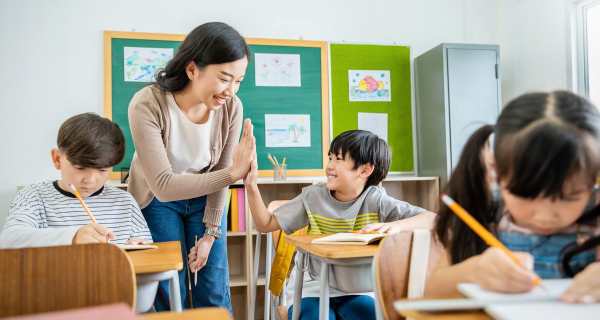Teacher's Guide: Why is Question-asking so Important for Gifted Learners? | Understanding Giftedness | HKAGE
The characteristics of the gifted reveal a strong basis for understanding the power of question-asking as a part of working effectively with them. The following list delineates the characteristic and the corresponding aspect of questioning that matches it.
- Natural curiosity — the desire to inquire about the world
- Rage to know and find out — the articulation of what needs to be known
- Wide information base — the potential database on which questions might be explored
- Strong thinking capacities — questions that focus on higher level thinking, e.g. critical thinking
- Enjoyment of real- world problem-solving — the motivational spark for conducting research, the enterprise framed by questions
Thus question-asking is a critical component of promoting inquiry among gifted learners. It is a strategy that calls for teachers to deliberately organise questions into clusters in order to elevate thinking.

Understanding Different Types of Questioning Models
Some questioning models are hierarchal in orientation, moving students from lower to higher level thinking. Others are more circular, moving from one higher level question to another, often not bothering to use lower order questions as a bridge. Other models deliberately exploit different kinds of thinking, moving from convergent to divergent to evaluative.
Guilford’s Model
One model that combines both a hierarchal approach and different types of thinking is the following four question strategy, based on the work of J. P. Guilford (1967):
Cognition | What is the name of the nuclear power plant in Japan that was compromised by the tsunami? Where is it? |
Convergence | What factors accounted for the series of explosions that rocked the nuclear power plant? |
Divergence | If you were a worker assigned to the nuclear power plant, how would you react to the crisis? |
Evaluative | In your opinion, should nuclear energy be promoted as an energy source, given its demonstrated danger? Why or why not? |
Further Reading: Understanding Twice-exceptional Students
Bloom’s Levels of Questioning
The use of Bloom’s taxonomy in its newest reiteration (Anderson & Kratwohl, 2000) is also a common method to enhance student learning from lower to higher levels.
Create | What is a different scenario that could be written to make Shakespeare’s Hamlet a more likable character? |
Evaluate | What is your assessment of Hamlet’s delay in killing his uncle? What would have happened if he had done it earlier in the play? |
Analyse | What comparisons may be drawn between Ophelia and Hamlet? |
Apply | How does Hamlet apply his hatred of his uncle in the play? |
Understand | What does the plot contribute to our understanding of the play? |
Remember | What is the plot of Hamlet? |

Power of Open-ended Questions
By engaging in open-ended questions or creating their own ones, gifted students will be more motivated and feel more challenged in their learning. This kind of questions does not look for a single answer. Instead, it fosters students’ open-mindedness through inviting their curiosity to explore possibilities. It also provokes students to think critically and reflect.
Examples:
S4 English
- Recently there have been voices from the public to urge the government to build a world-class stadium. Write a letter to the Leisure and Cultural Department expressing your views on this proposal.
- Read an article about the above issue. What assumptions does the author make about….? What are the implications and consequences of thinking that way? What additional points of view should be considered and why?
S1 Science
- Design an experiment to examine how plants adapt to the environment.
P6 General Studies
- If you were a government official in charge of public health concerns, how would you promote personal hygiene in Hong Kong?
Questioning to Guide Curriculum Development
Questions also provide an organising framework to curriculum development work because of their underlying connection to concepts that we want students to learn. Essential questions provide that service. Typically few in number, they set the stage for learning activities to follow that allow students to uncover the answers to these powerful questions. In a unit on “patterns of change” in history, for example, students might explore:
- What are the patterns of change over time as chronicled by historical events within and across cultures?
- What generalisations can be made from the evolutions of major cultures?
- What is the impact of ancient innovations on today?
The examples demonstrate the ways how conceptual learning could be promoted in a particular subject/ across disciplines to enrich the learning for top / high ability students in class who exhibit readiness for greater curricular challenge.
Further Reading: Nurturing the Potential of Gifted Students (Part 1): Academic Potential - Mathematics, Chinese, Science, High-level Intelligence
Further Reading: Nurturing the Potential of Gifted Students (Part 2): Non-academic Potential - Visual and Performing Arts, Leadership, Physical Fitness
Questioning to Enhance Inquiry
Finally, questions can be constructed that promote interpretative inquiry into a phenomenon without the use of a deliberate model. Our interest in weather patterns, for example, might lead us to question several aspects of what we do not understand through pointed questions that get at the unknown:
- What causes typhoons to become more or less intense as they travel?
- What prevention methods are most effective and why?
- Typhoons sometimes cause a lot of damages or even death. Is typhoon solely a devil? Give evidence to support your point of view.

Further Reading: Dispelling the 5 Common Myths about Giftedness
Further Reading: Nurturing the Emotional and Social Development of Gifted Students: Affective Education
Conclusion
The use of deliberate questions is a critical strategy for getting gifted students to learn about their world in more complex and in-depth ways. It provides multiple pathways for challenging the gifted through their content learning. It enhances their thinking by deliberately focusing attention on issues and problems that require solution in the real world. Questions can be improved by using a model for construction as models provide the scaffold for specific types of thinking.
Question-asking, however, is an art as well as a science. The late Mortimer Adler used to opine that one good question could carry a seminar for an hour. So it is not the number of questions that matter, but the quality of questions from which you as a teacher want to learn that elevates and enhances the learning process for students.
---------------------------------
*This article is adapted from:
VanTassel-Baska, J. (2013). Info kit: The use of questioning techniques in enhancing gifted students' learning. Hong Kong: The Hong Kong Academy for Gifted Education Ltd.
Other References
Anderson, L. W., Krathwohl, D. R., et al. (2000). Taxonomy for learning, teaching, and assessing: A revision of Bloom's taxonomy of educational objectives. New York, NY, Longman.
Guilford, J. P. (1967). The nature of human intelligence. New York: McGraw Hill Inc.
VanTassel-Baska, J., & Brown, E. (2007). Towards best practice: An analysis of the efficacy of curriculum models in gifted education. Gifted Child Quarterly. Fall, 51 (4), 342-358.






